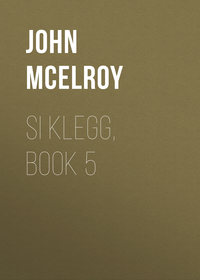 полная версия
полная версияSi Klegg, Book 1
Pretty soon he had all the company kettles employed, and then all that he could borrow from the other companies. But dip out as much as he would there seemed no abatement in the upheaving of the snowy cereal, and the kettles continued to foam over like so many huge glasses of soda water. He rushed to his bunk and got his gum blanket and heaped upon it a pile as big as a small haycock, but the mass in the kettle seemed larger than it was before this was subtracted.
He sweat and dipped, and dipped and sweat; burned his hands into blisters with the hot rice and hotter kettles, kicked over one of the largest kettles in one of his spasmodic rushes to save a portion of the food that was boiling over, and sent its white contents streaming over the ground. His misery came to a climax as he heard the quick step of his hungry comrades returning from drill.
"Right face; Arms a-port; Break ranks—March!" commanded the Orderly-Sergeant, and there was a clatter of tin cups and plates as they came rushing toward him to get their dinner—something to stay their ravenous stomachs. There was a clamor of rage, ridicule, wrath and disappointment as they took in the scene.
"What's the matter here?" demanded the Captain, striding back to the company fire. "You young rascal, is this the way you get dinner for your comrades? Is this the way you attend to the duty for which you're detailed? Waste rations in some fool experiment and scatter good food all over the ground? Biler, put on your arms and take Klegg to the guard-houae. I'll make you pay for this nonsense, sir, in a way that you won't forget in a hurry, I'll be bound."
So poor Si marched to the guard-house, where he had to stay for 24 hours, as a punishment for not knowing, until he found out by this experience, that rice would "s-well." The Captain wouldn't let him have anything to eat except that scorched and half-cooked stuff cut of the kettles, and Si thought he never wanted to see any more rice as long as he lived.
In the evening one of the boys took Si's blanket to him, thinking he would want it to sleep in.
"I tell ye, pard, this is purty derned tough!" said Si as he wiped a tear out of the southwest corner of his left eye with the sleeve of his blouse. "I think the Cap'n's hard on a feller who didn't mean to do nothin' wrong!" And Si looked as if he had lost all his interest in the old flag, and didn't care a pinch of his burnt rice what became of the Union.
His comrade "allowed" that it was hard, but supposed they, had got to get used to such things. He said he heard the Captain say he would let Si out the next day.
CHAPTER VII. IN THE AWKWARD SQUAD
SI HAS MANY TRIBULATIONS LEARNING THE MANUAL OP ARMSWHEN Si Klegg went into active service with Co. Q of the 200th Ind. his ideas of drill and tactics were exceedingly vague. He knew that a "drill" was something to make holes with, and as he understood that he had been sent down South to make holes through people, he supposed drilling had something to do with it. He handled his musket very much as he would a hoe. A "platoon" might be something to eat, for all he knew. He had a notion that a "wheel" was something that went around, and he thought a "file" was a screeching thing that his father used once a year to sharpen up the old buck saw.
The fact was that Si and his companions hardly had a fair shake in this respect, and entered the field at a decided disadvantage. It had been customary for a regiment to be constantly drilled for a month or two in camp in its own State before being sent to the front; but the 200th was rushed off to Kentucky the very day it was mustered in. This was while the cold chills were running up and down the backs of the people in the North on account of the threatened invasion by Bragg's army. The regiment pushed after the fleeing rebels, but whenever Suell's army halted to take breath, "Fall in for drill!" was shouted through its camp three or four times a day. It was liable to be called into action at any moment, and it was deemed indispensable to begin at once the process of making soldiers out of those tender-footed Hoosiers, whose zeal and patriotism as yet far exceeded their knowledge of military things. Most of the officers of the 200th were as green as the men, though some of them had seen service in other regiments; so, at first, officers and non-commissioned officers who had been in the field a few months and were considered veterans, and who knew, or thought they knew, all about tactics that was worth knowing, were detailed from the old regiments to put the boys through a course of sprouts in company and squad drill.
One morning three or four days after leaving Louisville, word was passed around that the regiment would not move that day, and the boys were so glad at the prospect of a day of rest that they wanted to get right up and yell. Si was sitting on a log, with his shoes off, rubbing his aching limbs and nursing his blisters, when the Orderly came along.
"Co. Q, be ready in 10 minutes to fall in for drill. Stir around, you men, and get your traps on. Klegg, put on them gunboats, and be lively about it."
"Orderly," said Si, looking as if he hadn't a friend on earth, "just look at them blisters; I can't drill to-day!"
"You'll have to or go to the guard-house," was the reply. "You'd better hustle yourself, too!"
Si couldn't think of anything to say that would do justice to his feelings; and so, with wailing and gnashing of teeth, and a few muttered words that he didn't learn in Sunday school, he got ready to take his place in the company.
As a general combustion of powder by the armies of Buell and Bragg was hourly expected, it was thought best for the 200th to learn first something about shooting. If called suddenly into action it was believed the boys could "git thar," though they had not yet mastered the science of company and battalion evolutions. Co. Q was divided into squads of eight for exercise in the manual of arms. The man who took Si's squad was a grizzled Sergeant, who had been "lugging knapsack, box and gun" for a year. He fully realized his important and responsible functions as instructor of these innocent youths, having at the same time a supreme contempt for their ignorance. "Attention, Squad!" and they all looked at him in a way that meant business.
"Load in nine times—Load!"
Si couldn't quite understand what the "in" meant, but he had always been handy with a shotgun, to the terror of the squirrels and coons up in Posey County, and he thought he would show the Sergeant how spry he was. So he rammed in a cartridge, put on a cap, held up his musket, and blazed away, and then went to loading again as if his life depended upon his activity. For an instant the Sergeant was speechless with amazement. At length his tongue was loosened, and he roared out:
"What in the name of General Jackson are you doing, you measly idiot! Who ordered you to load and fire your piece?"
"I—I th—thought you did!" said Si, trembling as if he had the Wabash ague. "You said for us to load nine times. I thought nine loads would fill 'er chuck full and bust 'er and I didn't see any way but to shute 'em oft as fast as I got 'em in."
"No, sir! I gave the command according to Hardee, 'Load—in—nine—times!' and ef yer hadn't bin in such a hurry you'd 'a' found out what that means. Yer'll git along a good deal faster ef you'll go slower. Yer ought ter be made ter carry a rail, and a big one, for two hours."
Si protested that he was sorry, and didn't mean to, and wouldn't do so again, and the drill went on. The master went through all the nine "times" of "Handle—Cartridge!" "Draw—Rammer!" etc., each with its two or three "motions." It seemed like nonsense to Si.
"Boss," said he, "I kin get 'er loaded in just half the time ef yer'll let me do it my own way!"
"Silence!"' thundered the Sergeant. "If you speak another word I'll have ye gagged 'n' tied up by the thumbs!"
Si had always been used to speaking right out when he had anything to say, and had not yet got his "unruly member" under thorough subjection. He saw that it wouldn't do to fool with the Drill Sergeant, however, and he held his peace. But Si kept thinking that if he got into a fight he would ram in the cartridge and fire them out as fast as he could, without bothering his head about the "one time and three motions."
"Order—Arms!" commanded the Sergeant, after he had explained how it was to be done. Si brought his gun down along with the rest like a pile-driver, and it landed squarely on the foot of the man next to him.
"Ou-ou-ouch!" remarked the victim of Si's inexperience.
"Didn't do it a'purpose, pard," said Si compassionately; "'pon my word I didn't. I'll be more keerful after this."
His suffering comrade, in very pointed language, urged upon Si the propriety of exercising a little more care. He determined that he would manage to get some other fellow to stand next to Si after that.
"Shoulder—Arms!" ordered the Sergeant, and the guns came straggling up into position. Then, after a few words of instruction, "Right shoulder shift—Arms!"
"Don't you know your right shoulder?" said the Sergeant, with a good deal of vinegar in his tone, to Si, who had his gun on the "larboard" side, as a sailor would say.
"Beg yer pardon," said Si; "I always was lefthanded. I'll learn if yer only gimme a show!"
"Silence!" again roared the Sergeant. "One more word, sir, and I will tie ye up, fer a fact!"
The Sergeant got his squad down to an "order arms" again, and then, after showing them how, he gave the order, "Fix—Bayonets!"
There was the usual clicking and clattering, during which Si dexterously managed to stick his bayonet into the eye of his comrade, whose toes were still aching from the blow of the butt of Si's musket. Si assured him he was sorry, and that it was all a mistake, but his comrade thought the limit of patience had been passed. So he confidently informed Si that as soon as drill was over he was going to "pound the stuffin'" out of him, and there wouldn't be any mistake about it, either.
When the hour was up the Captain of the company came around to see how the boys were getting along. The upshot of it was that poor Si was immediately organized into an "awkward squad" all by himself, and drilled an extra hour.
"We'll see, Mr. Klegg," said the Captain, "if you can't learn to handle your arms without mashing the toes and stabbing the eyes out of the rest of the company."
CHAPTER VIII. ON COMPANY DRILL
SI GETS TANGLED IN THE MAZES OF THE EVOLUTIONS"ALL in for company drill!"
These words struck the unwilling ears of Co. Q, 200th Ind., the next time Buell halted his army to draw a long breath.
"Wish somebody would shoot that durned Orderly," muttered Si Klegg. "For two cents I'd do it myself."
"Don't do it, Si," admonished Shorty, "They'd git another one that'd be just as bad. All orderlies are cusses."
Si believed it would be a case of justifiable homicide, and, if the truth must be told, this feeling was largely shared by the other members of the company. For more than a week the boys had been tramping over a "macadamized" Kentucky pike. Feet were plentifully decorated with blisters, legs were stiff and sore, and joints almost refused to perform their functions.
It had rained nearly all the previous day, and the disgusted Hoosiers of the 200th went sloshing along, wet to the skin, for 20 dreary miles. With that diabolical care and method that were generally practiced at such times, the Generals selected the worst possible locations for the camps. The 200th was turned into a cornfield, where the men sank over their shoetops in mud, and were ordered to bivouac for the night. The wagons didn't get up at all. How they passed the slowly-dragging hours of that dismal night will not be told at this time. Indeed, bare mention is enough to recall the scene to those who have "been there."
In the morning, when the company was ordered out for drill, Si Klegg was standing before the sputtering fire trying to dry his steaming clothes, every now and then turning around to give the other side a chance. The mercury in his individual thermometer had fallen to a very low point—in fact, it was a cold day for Si's patriotism. He had reached that stage, not by any means infrequent among the soldiers, when he "didn't care whether school kept or not."
"Well, Si, I s'pose you love your country this mornin'!" said Shorty. He was endeavoring to be cheerful under adverse circumstances.
"I ain't quite as certain about it," said Si, reflectively, "as I was when I left home, up in Posey County. I'm afeared I haven't got enough of it to last me through three years of this sort of thing!"
Si felt at that moment as though he was of no account for anything, unless it was to be decked with paint and feathers and stood for a sign in front of a cigar store.
The rain had ceased, and the Colonel of the 200th felt that he must, like the busy bee, "improve each shining hour" in putting his command into condition for effective service. So he told the Adjutant to have the companies marched over to an adjacent pasture for drill.
"Attention, Co. Q!" shouted the Captain, after the Orderly had got the boys limbered up enough to get into ranks. The Captain didn't know very much about drilling himself, but he had been reading up "Hardee," and thought he could handle the company; but it was a good deal like the blind trying to lead the blind.
"Right—Face!"
Not quite half the men faced the wrong way, turning to the left instead of the right, which was doing pretty well for a starter.
"Get around there, Klegg, and the rest of you fellows! Can't ye ever learn anything."
Si was so particularly awkward that the Captain put him at the tail-end of the company. Then he tried the right face again, and as the boys seemed to get around in fair shape he commanded:
"Right shoulder shift arms! Forward—March!"
The company started off; but the Captain was not a little surprised, on looking back, to see Si marching: off in the opposite direction. He had faced the wrong way again, and, as he didn't see the others, he thought he was all right, and away he went on his own hook, till a shout from the Captain told him of his mistake.
When the Captain reached the field which was the drill-ground for the day, he thought he would try a wheel. After a brief lecture to the company on the subject he gave the command for the movement.
It is scarcely necessary to say that the first trial was a sad failure. The line bulged out in the center, and the outer flank, unable to keep up, fell behind, the company assuming nearly the shape of a big letter C. Then the boys on the outer end took the double-quick, cutting across the arc of the proper circle, which soon resulted in a hopeless wreck of the whole company. The Captain halted the chaotic mass of struggling men, and with the help of the Orderly finally succeeded in getting them straightened out and into line again. The men had often seen practiced soldiers going through this most difficult of all tactical movements, and it seemed easy enough; they didn't see why they couldn't do it just as well as the other fellows. They kept at it, and in the course of half an hour had improved so much that they could swing around in some kind of shape without the line breaking to pieces.
CHAPTER IX. SI GETS A LETTER
AND WRITES ONE TO PRETTY ANNABEL, UNDER DIFFICULTIES"COMPANY Q, tumble up here and git yer mail!" shouted the Orderly one afternoon, soon after the 200th Ind. turned into a tobacco patch to bivouac for the night. It had been two weeks since the regiment left Louisville, and this was the first mail that had caught up with it.
It seemed to the boys as if they had been away from home a year. For a whole fortnight they hadn't heard a word from their mothers, or sisters, or their "girls." Si Klegg couldn't have felt more lonesome and forsaken if he had been Robinson Crusoe.
In the excitement of distributing the mail everything else was forgotten.. The boys were all getting their suppers, but at the thought of letters from home even hunger had to take a back seat.
Si left his coffee-pot to tip over into the fire, and his bacon sizzling in the frying-pan, as he elbowed his way into the crowd that huddled around the Orderly.
"If there ain't more'n one letter for me," said Si softly to himself, "I hope it'll be from Annabel; but, of course, I'd like to hear from Ma and sister Marier, too!"
The Orderly, with a big package of letters in his hand, was calling out the names, and as the boys received their letters they distributed themselves through the camp, squatting about on rails or on the ground, devouring with the greatest avidity the welcome messages from home. The camp looked as if there had been a snowstorm.
Si waited anxiously to hear his name called as the pile letters rapidly grew smaller, and he began to think he was going to get left.
"Josiah Klegg!" at length shouted the Orderly, as he held out two letters. Si snatched them from his hand, went off by himself, and sat down on a log.
Si looked at his letters and saw that one of them was addressed in a pretty hand. He had never received a letter from Annabel before, but he "felt it in his bones" that this one was from her. He glanced around to be certain nobody was looking at him, and gently broke the seal, while a ruddy glow overspread his beardless cheeks. But he was secure from observation, as everybody else was similarly intent.
"Dear Si," the letter began. He didn't have to turn over to the bottom of the last page to know what name he would find there. He read those words over and over a dozen times, and they set his nerves tingling clear down to his toe-nails. Si forgot his aches and blisters as he read on through those delicious lines.
She wrote how anxious she was to hear from him and how cruel it was of him not to write to her real often; how she lay awake nights thinking about him down among those awful rebels; how she supposed that by this time he must be full of bullet-holes; and didn't he ge' hungry sometimes, and wasn't it about time for him to get a furlough? how it was just too mean for anything that those men down South had to get up a war; how proud she was of Si because he had 'listed, and how she watched the newspapers every day to find some thing about him; how she wondered how many rebels he had killed, and if he had captured any batteries yet—she said she didn't quite know what batteries were, but she read a good deal about capturing 'em, and she supposed it was something all the soldiers did; how she hoped he wouldn't forget her, and she'd like to see how he looked, now that he was a real soldier, and her father had sold the old "mooley" cow, and Sally Perkins was engage to Jim Johnson, who had stayed at home, and as for herself she wouldn't have anybody but a soldier about the size of Si, and 'Squire Jones's son had been trying to shine up to her and cut Si out, but she sent him off with a flea in his ear.
"Yours till deth, Annabel."
The fact that there was a word misspelt now and then did not detract in the least from the letter, so pleasing to Si. In fact, he was a little lame in orthography himself, so that he had neither the ability nor the disposition to scan Annabel's pages with a critic's eye. Si was happy, and as he began to cast about for his supper he even viewed with complacence his bacon burned to a crisp and his capsized coffee-pot helplessly melting away in the fire.
"Well, Si, what does she say?" said his friend Shorty.
"What does who say?" replied Si, getting red in the face, and bristling up and trying to assume an air of indifference.
"Just look here now. Si," said Shorty, "you can't play that on me. How about that rosy-cheeked girl up in Posey County?"
It was Si's tender spot. He hadn't got used to that sort of thing yet, and he felt that the emotions that made his heart throb like a sawmill were too sacred to be fooled with. Impelled by a sudden impulse he smote Shorty fairly between the eyes, felling him to the ground.
The Orderly, who happened to be near, took Si by the ear and marched him up to the Captain's quarters.
"Have him carry a rail in front of my tent for an hour!" thundered the Captain. "Don't let it be a splinter, either; pick out a good, heavy one. And, Orderly, detail a guard to keep Mr. Klegg moving."
Of course, it was very mortifying to Si, and he would have been almost heartbroken had he not been comforted by the thought that it was all for her! At first he felt as if he would like to take that rail and charge around and destroy the whole regiment; but, on thinking it over, he made up his mind that discretion was the better part of valor.
As soon as Si's hour was up, and he had eaten supper and "made up" with Shorty, he set about answering his letter. When, on his first march, Si cleaned out all the surplusage from his knapsack, he had hung on to a pretty portfolio that his sister gave him. This was stocked with postage stamps and writing materials, including an assortment of the envelopes of the period, bearing in gaudy colors National emblems, stirring legends, and harrowing scenes of slaughter, all intended to stimulate the patriotic impulses and make the breast of the soldier a very volcano of martial ardor.
When Si got out his nice portfolio he found it to be an utter wreck. It had been jammed into a shapeless mass, and, besides this, it had been soaked with rain; paper and envelopes were a pulpy ruin, and the postage stamps were stuck around here and there in the chaos. It was plain that this memento of home had fallen an early victim to the hardships of campaign life, and that its days of usefulness were over.
"It's no use; 'tain't any good," said Si sorrowfully, as he tossed the debris into the fire, after vainly endeavoring to save from the wreck enough to carry, out his epistolary scheme.
Then he went to the sutler—or "skinner," as he was better known—and paid 10 cents for a sheet of paper and an envelope, on which were the cheerful words, "It is sweet to die for one's country!" and 10 cents more for a 3-cent postage stamp. He borrowed a leadpencil, hunted up a piece of crackerbox, and sat down to his work by the flickering light of the fire. Si wrote:
"Deer Annie."
There he stopped, and while he was scratching his head and thinking what he would say next the Orderly came around detailing guards for the night, and directed Klegg to get his traps and report at once for duty.
"It hain't my turn," said Si. "There's Bill Brown, and Jake Schneider, and Pat Dooley, and a dozen more—I've been since they have!"
But the Orderly did not even deign to reply. Si remembered the guard-house, and his shoulder still ached from the rail he had carried that evening; so he quietly folded up his paper and took his place with the detail.
The next morning the army moved early, and Si had no chance to resume his letter. As soon as the regiment halted, after an 18-mile march, he tackled it again. This time nothing better offered in the way of a writing-desk than a tin plate, which he placed face downward upon his knee. Thus provided, Si plunged briskly into the job before him, with the following result:
"I now take my pen in hand to let you know that I am well, except the doggoned blisters on my feet, and I hope these few lines may find you enjoying the same blessings."
Si thought this was neat and a good start for his letter. Just as he had caught an idea for the next sentence a few scattering shots were heard on the picket-line, and in an instance the camp was in commotion. "Tall in!" "Be lively, men!" were heard on every hand.
Si sprang as if he had received a galvanic shock, cramming the letter into his pocket. Of course, there wasn't any fight. It was only one of the scares that formed so large a part of that campaign. But it spoiled Si's letter-writing for the time.
It was nearly a week before he got his letter done. He wrote part of it using for a desk the back of a comrade who was sitting asleep by the fire. He worked at it whenever he could catch a few minutes between the marches and the numerous details for guard, picket, fatigue and other duty. He said to Annie:
"Bein' a soljer aint quite what they crack it up to be when they're gittin' a fellow to enlist. It's mity rough, and you'd better believe it. You ought to be glad you're a gurl and don't haf to go. I wish't I was a gurl sometimes. I haven't kild enny rebbles yet. I hain't even seen one except a fiew raskils that was tuk in by the critter soljers, they calls em cavilry. Me and all the rest of the boys wants to hav a fite, but it looks like Ginral Buil was afeared, and we don't git no chance. I axed the Ordly couldn't he get me a furlow. The Ordly jest laft and says to me, Si, says he, yer don't know as much as a mule. The Capt'n made me walk up and down for an hour with a big rail on my sholder.









